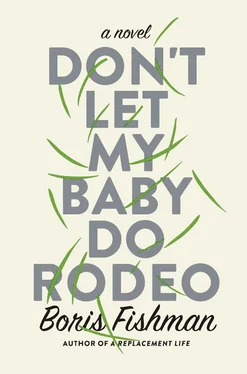“The child must be sick in some way,” Maya had said to Mishkin when he’d told her, late one afternoon. She was just back from the hospital.
“No!” Mishkin yelled. “Not at all. You must not think in that old-world way, Mrs. Rubin.”
“So what is the reason?” she said, trying to ignore Mishkin’s insult. She tried to sound skeptical. How odd that a child could be announced like the win in a contest. But wasn’t that the way with normal mothers? One day they woke up and, eureka: pregnant. It was in what followed that the pathways diverged. A normal mother had nine months to get used to the result; Maya could have her child right away. She stopped herself: She was missing crucial information being transmitted by Mishkin. In the chaos of her mind, he appeared to her as a spoonbill, the huge mouth moving endlessly.
“We don’t know the reason, Mrs. Rubin,” he was saying. “We don’t ask. But the child is healthy. Which isn’t always the case, you are right. But it is here. Full medical checkup, full family history, verified and reverified.”
“He is just born?” she said.
“Just about.”
“So why don’t they want him?” Maya said.
“Do you want him, Mrs. Rubin? Let’s not lose our eyes on the prize here. They chose you, Mrs. Rubin. They want you.”
Maya tried to ignore the warming flush of the affirmation. “Why us?” she insisted. She tried to keep up the skepticism that Alex would have channeled were he home. (Had the adoption supervisor purposefully called when he knew he would get the gullible Rubin?)
“I don’t know. Because you’re far. They want the baby to go far.”
“Far from where?”
“Montana, like I told you.”
“What’s wrong with Montana?” Maya said. “Where is it?”
“Again, I don’t know. I mean, I know where Montana is. I don’t know what’s wrong with it. Nothing’s wrong with it. It’s beautiful.”
“It can’t be more beautiful than New Jersey,” Maya said savagely, and, defeated by the mysteriousness of her ill will, sank into a chair.
“I don’t have a dog in this fight except you getting a kid, Mrs. Rubin,” Mishkin said. “Can I ask you a question because this, actually, we didn’t discuss. Did you hope for a boy or a girl?”
“I don’t know,” Maya said. “A boy?”
“Okay,” he said. “ Okay. It’s a boy.”
In the kitchen that evening, Maya and Alex sat and stared at each other. Montana? Well, they had demanded an American child; this, too, was part of America. They had imagined Chicago, Florida, even Texas. But Montana? Maya had almost asked Mishkin if English was spoken there, then lamented her idiocy.
On the phone, she had declared that she would refuse the adoption until she spoke to the parents. With satisfaction, the adoption supervisor reminded her that she and her husband had insisted on closed. Photos would come via the agency, the medical work-over, too. But no information about the parents. At a certain point, the Rubins would have to fly to Montana and take up residence in a hotel room while the state verified their identity and dotted the i ’s with New Jersey. Then the child was theirs.
The pictures arrived with an equally perturbing lack of significance; she was looking at a newborn with sleepy eyes and a wary expression. He looked like a big cake. Why was this her child? Desperately, she studied the margins of the photographs instead of the child at their center. Who were the parents? How did they live? Were there baby wipes in Montana? How did they hold the feet when they wiped him? Did he get diarrhea? How much diarrhea was okay before getting concerned? It was the parents she wished to possess. By being denied to her, they became what she most wanted to know. She and Alex signed the papers.
A week after, the late-evening phone call came — too late for it to mean anything good. Alex was on the La-Z-Boy clicking through channels, and Maya was making a soup to last their lunches the rest of the week. Wooden spoon fishing for cabbage leaves, she called out to Alex, but he had fallen asleep. She hustled over to the cordless and jammed the receiver under her ear. Her stomach lurched. Mishkin wouldn’t call so late unless there was terrible news, unless it could not wait till the following morning, unless it was all off.
“Mrs. Rubin,” he said. “You sitting down?” For a moment, Maya wondered if Mishkin was going to make her sit down at nine thirty P.M. just so he could tell her: The adoption was off. Or: The ancestral Mishkins had grown plums.
“So, look, Mrs. Rubin,” Mishkin said. “Adoptions are volatile. Emotions are high. It doesn’t mean — a person’s unstable. It drives people to act. . in ways they wouldn’t otherwise act. In yourself — I think you’ve seen that.”
“Excuse me?” Maya said. The choppy way in which Mishkin spoke made Maya suspicious, as if he was titrating information whose badness, should it come in a torrent, would become obvious.
“Never mind that,” Mishkin said. “My point is, Laurel’s a firecracker. She’s eighteen, but she comes on with a force twice of that. A hole in my ear every time that we talk. You two are made for each other. You ought to meet.”
“We can’t,” Maya reminded him.
“Well, that’s just it,” Mishkin said.
“What, Mishkin, what!” Maya demanded. In her condition, she had forgotten to filter his name through the sieve of diplomacy and referred to him by the shorthand used by the Rubins. But Mishkin was silent, a hesitation unbecoming the cataract of Gabriel Mishkin. Whereas a moment before Maya was angry, now she was frightened.
“Now don’t you go cuckoo on me about this, all right?” the adoption supervisor finally said. “I’ve been in this business getting on twenty years and I’ve never seen it myself. But it’s high emotion, like I said. Makes people do funny things. The mother is a wild one. Not that — not that — please don’t think she’s irresponsible. You can tell these are responsible, well-thinking young people because they’ve chosen you to adopt their boy. That’s how you know.”
“Please explain right now,” Maya said, stifling a wave of murderous anger.
“Laurel and Tim,” Mishkin said. “They want to deliver the child.”
“What do you mean ‘deliver’?” Maya said.
“You know — like takeout.” Mishkin giggled.
Maya wanted to tell Mishkin that he could be far more pious toward the vocation he had selected, but she didn’t dare. She felt she depended on this man’s goodwill, even as she detested both him and that fact. She didn’t say anything, for if she spoke, she would speak an insult.
“They want to bring the child, Mrs. Rubin. Hand him over to you. And I know it doesn’t sound like it, but this is a positive development. It saves you from — if you’d gone to pick up the child, you’d have to sit in a Montana hotel room for three weeks while the states talked to each other. Otherwise, it’s kidnapping. But if the parents bring him to you?” Mishkin produced a whistling noise meant to indicate problem solved .
Maya remained silent.
“Mrs. Rubin, the child is a blessing,” Mishkin said. “Healthy and beautiful. The only thing holding you back now is all of a sudden you’re wondering what you got yourself into. I know the feeling. But you’re not like your husband — I say this with all due respect. You have the drive. Leap forward, Mrs. Rubin. I know this is unconventional. But if you get past the wrapping, it’s actually a very good thing. I know you always think I am trying to push you. I have nothing to sell here except the fulfillment of what you told me you wanted. This is what I’ll never understand about you folks, no matter how much time you spend in the country. You fight like no one fights for the things that you want. And then they arrive, and you push against them like children. Why is this, Mrs. Rubin? I guess it has to wait until the next generation. Well, I am giving you the next generation. Please take it.”
Читать дальше












